|
|
|
Sort Order |
|
|
|
Items / Page
|
|
|
|
|
|
|
| Srl | Item |
| 1 |
ID:
124016
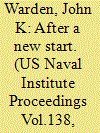

|
|
|
|
|
| Publication |
2012.
|
| Summary/Abstract |
While the United States has signed on to reduce its nuclear arsenal, the U.S. sea-based missile force remains crucial in a world where deterrence still matters.
|
|
|
|
|
|
|
|
|
|
|
|
|
|
|
|
| 2 |
ID:
177817


|
|
|
|
|
| Summary/Abstract |
This paper is an assessment of cybersecurity principles within the nuclear arsenal of the United States, specifically the nuclear-armed intercontinental ballistic missile forces. Ongoing modernizations will introduce new components, and potentially new vulnerabilities, into U.S. nuclear forces. The principles for achieving secure operations from the fields of computer security, dependable computing, and systems analysis, and the extent to which they are addressed within the management of U.S. nuclear intercontinental ballistic missiles is discussed. This paper then considers the types of vulnerabilities that may be overlooked during modernizations, followed by a critique of U.S. nuclear command and control policy choices that could make the consequences of these vulnerabilities more catastrophic.
|
|
|
|
|
|
|
|
|
|
|
|
|
|
|
|
| 3 |
ID:
131634
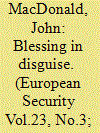

|
|
|
|
|
| Publication |
2014.
|
| Summary/Abstract |
This article examines the implications of Scottish independence for the UK's nuclear posture. It is argued here that a vote for independence will critically undermine this posture. Since the UK nuclear force operates entirely out of Scotland, and since the Scottish government continues to assert its intention to see nuclear weapons removed from an independent Scotland, it is overwhelmingly likely that a 'Yes' vote will prompt a demand for the drawdown of the UK nuclear force in Scotland. If it wished to maintain its nuclear capability, the UK government would then have to make alternative basing arrangements. It is argued here that a host of legal, financial and political difficulties may preclude any such relocation and that Downing Street may ultimately be left with little option but to surrender the UK's nuclear capability. This article concludes that far from weakening the UK, a surrendering of its nuclear posture would result in a stronger and more functional UK military footprint and would bolster the UK's standing in the international arena.
|
|
|
|
|
|
|
|
|
|
|
|
|
|
|
|
| 4 |
ID:
119767
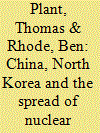

|
|
|
|
|
| Publication |
2013.
|
| Summary/Abstract |
Once described as 'as close as lips and teeth', in recent years the relationship between China and North Korea has become more strained. Beijing has conflicted motivations in its policy towards Pyongyang. It resents the disruption North Korean provocation brings to Northeast Asia. Some observers argue that Beijing's North Korea policy is illogical, as it increases anti-Chinese resentment and support for America's military presence in Asia.1 (When Beijing gave Pyongyang diplomatic cover after North Korean forces sank the South Korean corvette Cheonan and shelled Yeonpyeong Island in 2010, it damaged China's image and strengthened cooperation between South Korea, Japan and the United States.) And China's indefinite protection of North Korea's nuclear arsenal might one day encourage Seoul or Tokyo to seek their own nuclear deterrents, although this will remain unlikely as long as the United States retains a meaningful military presence in East Asia. In the shorter term, the North Korean nuclear threat has prompted Tokyo and Seoul to introduce ballistic-missile defences, much to China's displeasure.
|
|
|
|
|
|
|
|
|
|
|
|
|
|
|
|
| 5 |
ID:
176970
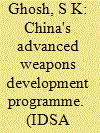

|
|
|
| 6 |
ID:
184536
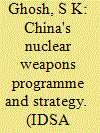

|
|
|
| 7 |
ID:
115972
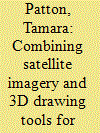

|
|
|
|
|
| Publication |
2012.
|
| Summary/Abstract |
The ability to extract three-dimensional (3D) data from two-dimensional satellite images provides opportunities to apply novel geospatial techniques to problems relating to nuclear arms control, nonproliferation, and disarmament. This study demonstrates some of these techniques by estimating the plutonium production capacity of the heavy water nuclear reactors at the Khushab complex in Pakistan, where since 1998 Pakistan has produced plutonium for its nuclear arsenal. Three-dimensional analysis is used to assess the viability of using the horizontal cross-sectional area of the Khushab reactors' mechanical draft cooling towers to estimate the thermal capacity of each reactor and set an upper bound for the reactors' abilities to produce plutonium. The horizontal area approach suggests the three completed Khushab reactors have a thermal power of 40-90 MWt each. The results suggest that a horizontal area approach can be used successfully with the Khushab reactors, as well as other low power, research-type reactors employing mechanical draft cooling towers.
|
|
|
|
|
|
|
|
|
|
|
|
|
|
|
|
| 8 |
ID:
133995
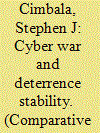

|
|
|
|
|
| Publication |
2014.
|
| Summary/Abstract |
Nuclear deterrence and cyber war are often discussed as separate worlds of research and military-strategic practice. To the contrary, a certain degree of overlap between nuclear deterrence and cyber conflicts is a plausible expectation for several reasons. First, future deterrent challenges will include regional nuclear arms races accompanied by competition in information technology and other aspects of advanced conventional command-control and precision strike systems. Second, cyber-attacks may be used against opposed nuclear command-control systems and weapons platforms as well as against infrastructure for the purpose of mass disruption during a crisis or war. Third, cyber capabilities support escalation dominance or escalation control, depending on the objectives of states and on the transparency of identification for cyber friends and foes.
|
|
|
|
|
|
|
|
|
|
|
|
|
|
|
|
| 9 |
ID:
142788
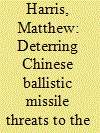

|
|
|
|
|
| Summary/Abstract |
The Chinese government has made great strides to creating an improved and increasingly capable nuclear arsenal. Despite these developments and deployments, the U.S. government continues to rely on dialogue and strategic stability to deter U.S.-Chinese war. This sole reliance on offensive strategic forces fails to adequately protect the American people from Chinese ballistic missile threats, especially ones armed with nuclear weapons. Preventing a Chinese nuclear weapon from annihilating U.S. cities will do more for deterring nuclear war than emphasizing dialogue and strategic stability while the Chinese government continues to modernize and expand its nuclear arsenal.
|
|
|
|
|
|
|
|
|
|
|
|
|
|
|
|
| 10 |
ID:
062492
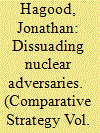

|
|
|
|
|
| Publication |
Apr-Jun 2005.
|
|
|
|
|
|
|
|
|
|
|
|
|
|
|
|
| 11 |
ID:
132785
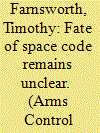

|
|
|
|
|
| Publication |
2014.
|
| Summary/Abstract |
A new draft of the European Union's proposed international code of conduct for activities in outer space was released during a May 27-28 meeting in Luxembourg, but despite the revisions, it is unclear which countries will support the code.
"We are fully aware that [the current draft] does not meet the concerns and expectations of all," Jacek Bylica of the EU, chairman of the meeting, said in his closing remarks.
The meeting was the last of a series of three consultations that began in Kiev in May 2013 and continued in Bangkok in November 2013. The meetings represented an effort to expand the group of negotiating states beyond the established spacefaring countries. (See ACT, May 2013.) During the three meetings, officials from more than 80 countries met to discuss elements of a code, with many disagreements remaining throughout the process
|
|
|
|
|
|
|
|
|
|
|
|
|
|
|
|
| 12 |
ID:
133858
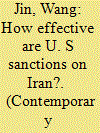

|
|
|
|
|
| Publication |
2014.
|
| Summary/Abstract |
U. S. sanction on Iran have expended since the start of the Iranian nuclear issue. They have grown from small scale embargoes to today's sanctions on multiple sectors including finance, trade, energy and personnel. During U. S. President Barak Obama's tenure, there is very little likelihood that the U. S will resort to force, leaving Washington with no other means than sanctions to persuade Iran to change its nuclear policy. This means that although sanctions have a limited effect, the US will continue primarily rely on them to force Iran's hand.
|
|
|
|
|
|
|
|
|
|
|
|
|
|
|
|
| 13 |
ID:
131442
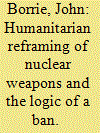

|
|
|
|
|
| Publication |
2014.
|
| Summary/Abstract |
The achievement of past international treaties prohibiting anti-personnel mines and cluster munitions showed that unpropitious political situations for dealing with the effects of problematic weapons could be transformed into concrete, legally binding actions through humanitarian-inspired initiatives. Although there is now renewed concern about the humanitarian consequences of nuclear weapons, some policy makers dispute the relevance of these past processes. This article examines how and why cluster munitions became widely reframed as unacceptable weapons, and the nature and significance of functional similarities with contemporary efforts of civil society activists to instigate humanitarian reframing of nuclear weapons and promote the logic of a ban treaty in view of its norm-setting value among states. In the case of cluster munitions, the weapon in question was signified as unacceptable in moral and humanitarian law terms because of its pattern of harm to civilians with reference to demonstrable evidence of the consequences of use. Ideational reframing was instigated by civil society actors, and introduced doubts into the minds of some policy-makers about weapons they had previously considered as unproblematic. This is relevant to the current discourse on managing and eliminating nuclear weapons in the Nuclear Non-Proliferation Treaty, in which there is dissonance between the rhetoric of those states claiming to be responsible humanitarian powers and their continued dependence on nuclear weapons despite questions about the utility or acceptability of these arms.
|
|
|
|
|
|
|
|
|
|
|
|
|
|
|
|
| 14 |
ID:
069251
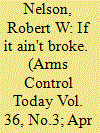

|
|
|
| 15 |
ID:
129548
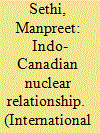

|
|
|
|
|
| Publication |
2014.
|
| Summary/Abstract |
Canada was among the first countries to participate in India's nuclear power program. Not only was CIRUS the first research reactor to be built in India with outside help; it was also Canada's first reactor export and marked a breakthrough for its nuclear industry. But the nuclear relationship foundered when India conducted a peaceful nuclear explosion in 1974. Differences over non-proliferation and Cold War considerations kept India and Canada apart until the turn of the millennium. Then a number of factors coalesced in the first decade of the 21st century to lead the two countries to reconsider their nuclear engagement and sign a nuclear cooperation agreement in 2010. What made this possible? What are the major contours of the agreement? What potential does it hold? And what issues still bedevil the nuclear relationship? This article provides a new perspective on the possibilities and challenges of the Indo-Canadian nuclear relationship and highlights the importance of the nuclear dimension in their larger bilateral engagement. While the paper acknowledges that the relationship was influenced by Cold War considerations, it steers clear of the issues of alignment and non-alignment and deals with the historical context of the relationship only to extrapolate the possibilities and challenges for the future.
|
|
|
|
|
|
|
|
|
|
|
|
|
|
|
|
| 16 |
ID:
131418
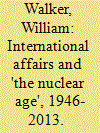

|
|
|
|
|
| Publication |
2014.
|
| Summary/Abstract |
The article reflects on the distinguished record of publication, in around 130 articles over nearly seventy years, on nuclear politics in International Affairs. Although constituting a small drop in the torrent of writings on nuclear matters since 1945, it can fairly be regarded as the most significant contribution to nuclear discourse by any journal outside the United States. The articles published in International Affairs have covered a wide range of issues including nuclear deterrence and strategy, arms control, non-proliferation and disarmament, and the policies-and drivers of policy-of countries, in particular the UK and US. Authors have included P. M. S. Blackett, Wyn Bowen, Alastair Buchan, Hedley Bull, Pierre Hassner, Michael Howard, Rebecca Johnson, Michael MccGwire, Michael Quinlan, Nick Ritchie, John Simpson and David Yost. The discussion concludes with Ian Smart's article of 1975 in which he contemplates the nature of the 'nuclear age' and its persistence or passing, and comments on governments' 'fatuous' attachment of prestige value to nuclear weapons.
|
|
|
|
|
|
|
|
|
|
|
|
|
|
|
|
| 17 |
ID:
131384
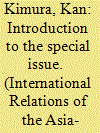

|
|
|
|
|
| Publication |
2014.
|
| Summary/Abstract |
In recent years, East Asian countries have faced serious challenges with regard to regional security. The bilateral relationships between China and Japan, and Japan and South Korea, have become increasingly strained due to a variety of disagreements over key political issues, such as territorial claims. Some observers argue that China and Japan may become involved in a direct military confrontation in the near future over the Senkaku/Diaoyu Islands. The increasing levels of naval and aerial engagements between the two countries demonstrate that such arguments can no longer be seen as 'out of the question'. While two democracies in the region, Japan and South Korea, are both major alliance partners with the United States and share the key security concern of countering North Korea's nuclear and conventional provocations, the two have suffered deteriorating relations since 2012. For instance, the General Security of Military Information Agreement, which provided a mechanism through which Japan and South Korea could share military technology, was canceled in July 2012. Furthermore, the two states have been embroiled in an increasingly antagonistic territorial dispute over Takeshima/Dokdo Islands since President Lee Myung-bak's visit to the islands in August 2012.
|
|
|
|
|
|
|
|
|
|
|
|
|
|
|
|
| 18 |
ID:
133523
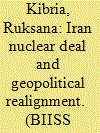

|
|
|
|
|
| Publication |
2014.
|
| Summary/Abstract |
The November 2013 interim nuclear deal that was signed between the P5+1 and Iran is an epochal event, though, given the volatile situation, it may be too early to make a correct prognosis of its ramifications. For one thing, the nuclear deal could complicate the regional security environment by exacerbating Saudi-Iranian tension, though as such, it is not the source. Regardless of Saudi displeasure at the conclusion of the accord, Iran's ascendancy is amply clear, with its ambiguous nuclear status playing a strategic role. While the dominant narrative currently is the centrality of Shia-Sunni regional tension represented by Iran and Saudi Arabia, reality is far more intricate and multi-dimensional, requiring a more nuanced appreciation of their relationship, which suggests that, for the foreseeable future it would be in the US interest to have Saudi Arabia, off-setting Iran, but from a much weaker position, in a replay of the game of balance of power achieved through sustained geopolitical manipulation, and a smaller American foot-print. The goal of Tehran's nuclear brinksmanship is essentially ensuring its regional primacy, which accords with US interests, too. While the recent interim Iran deal apparently concerns the nuclear issue, it has far-reaching implications for the global energy market, which the relaxation of economic sanctions and the integration of Iran as a legitimate member of the international community is certain to affect. US-Iran normalisation of relations is quietly enhancing China's role, both economic and military, in the Gulf region, whose energy resources for the foreseeable future would continue to remain crucial for Beijing. More than a reconciliation between Washington and Tehran, the essence of a real paradigm shift would involve a Saudi-Iranian accommodation, and de facto Saudi acceptance of Iran's regional pre-eminence.
|
|
|
|
|
|
|
|
|
|
|
|
|
|
|
|
| 19 |
ID:
129109
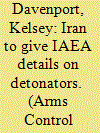

|
|
|
|
|
| Publication |
2014.
|
| Summary/Abstract |
Iran will provide the International Atomic Energy Agency (IAEA) with information about its past development of a detonator that could be used to as a trigger in nuclear weapons, according to an agreement reached by the two sides last month. In a Feb. 9 joint statement, Iran and the IAEA described the two days of talks in Tehran as "constructive" and announced seven actions for Iran to take by May 15 to further the agency's investigations into its unresolved concerns about Iran's current nuclear program and past actions. One of the actions requires Tehran to provide the IAEA with information on exploding bridge wire detonators, which can be used to trigger nuclear weapons. They can also be used in civilian applications, including drilling for oil and gas, and for conventional military explosives.
|
|
|
|
|
|
|
|
|
|
|
|
|
|
|
|
| 20 |
ID:
129533
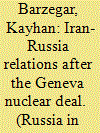

|
|
|
|
|
| Publication |
2014.
|
| Summary/Abstract |
In the triangle of Iran-U.S.-Russia relations, Russia is likely to strengthen its relations with Iran to equate the role and influence of its rival global power and Iran will attempt to stay in its independent track willing to expand relations to the one that accepts its regional role and global status.
The Geneva nuclear deal between Iran and the P5+1 and the possibility of rapprochement between Iran and the United States has provoked the debate that under the new circumstance Iran-Russia relations would not be as warm and expanded as in the past. But improved Iran-U.S. relations will not necessarily be at the expense of the traditional Iran-Russia ties; they may rather trigger some new potentials for these ties.
|
|
|
|
|
|
|
|
|
|
|
|
|
|
|
|
|
|
|
|
|